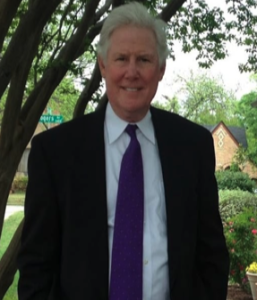David Casstevens
Died Jan. 24, 2024
The Dallas Morning News
David Casstevens, a lyrical writer who never let X’s and O’s get in the way of a good story in a career spanning five decades with seven newspapers, including The Dallas Morning News, died Jan. 24, 2024,after a long, debilitating struggle with COVID. He was 77.
He was a University of Texas journalism graduate and a sportswriter for The Daily Texan.
Casstevens won local, state and national sports writing awards as a beat reporter, feature writer and columnist, but he also authored or co-authored three books and spent the last two decades in his native Fort Worth writing about subjects that caught his eye for the eccentric.
Wherever he worked, the verdict of his peers was universal.
“He was just like his writing,” said Art Chapman, a colleague at the Fort Worth Star-Telegram. “He was very casual, lyrical. No pretense at all.
“He was not a self-promoter.”
The lack of ego for a writer of his talent was unusual, particularly coming of age as he did in the ‘70s at the Houston Post and ‘80s at The News. He was a sports feature writer at the latter when SportsDay debuted in August 1981 under the leadership of Dave Smith, hired to help win a newspaper war with the Dallas Times Herald.
“David was a very talented writer who was a key player in making SportsDay one of the country’s best,” Smith said Friday. “Quiet, unassuming and a joy to work with.”
Only a year after taking over as sports editor, Smith elevated both Casstevens and Randy Galloway to positions as full-time columnists. Three years later, he added Blackie Sherrod, the king of Texas sports writers.
They were a study in contrasts: Sherrod, the Runyonesque stylist; Galloway, a two-fisted brawler; and Casstevens, a gentle soul and storyteller who never inserted himself between subject and story.
“I would tell people it’s the perfect trio of columnists,” Galloway said, “because we had the greatest who ever lived in Blackie Sherrod. We had, in David, a terrific writer, and then you had me throwing hammers at everybody. So it was three totally different styles, and I thought it worked great for The Dallas Morning News. A lot of other people did, too, at least for a while.”
In a 1986 D Magazine story about the city’s sports columnists, Steve Pate acknowledged that critics considered Casstevens’ copy “too soft.” Pate, a formidable and acerbic writer in his own right, called Casstevens “gracious, mild-mannered, clever without being brash, a great observer and a great listener. His approach to the world of sports may not sit well with the jockaholics, the superfans. He happily leaves the hammering to Galloway. But his style is appealing to the casual sports fan, of whom there are great numbers, and to anyone, fan or not, who likes to read a good story.”
Born in Fort Worth, Casstevens graduated in 1964 from Paschal High, where Dan Jenkins preceded him. Not that Casstevens would have noticed. He didn’t read sports columnists until his freshman year at Texas, though he started at the top with Sherrod.
Before columnist gigs at The News and Arizona Republic, where he later became executive sports editor, Casstevens started out at the Abilene Reporter-News, followed in short order by the Waco Tribune-Herald and Times Herald. His first beat at the Post was the Houston Oilers, coached by Bill Peterson. Rarely has a subject and writer been better matched.
Remembered for his malapropisms, Peterson set up punchlines like a bartender serving drinks at happy hour. His coaching was just as indecipherable. The Oilers finished 1-13 his first season and, proving it was no fluke, did the same the next year, too.
Casstevens swung into the spirit, leading his last game story of the ‘72 season like this:
Whoever said this was the season to be jolly never had his halls decked 61-17 by the Cincinnati Bengals.
After becoming a columnist in Houston, Casstevens continued to write about the Oilers, a favorite subject in particular.
In his prime, Earl Campbell had no peer. The Houston Oilers running back was an 18-wheeler roaring down a steep grade, horn blaring. He was king of the road. Earl didn’t just carry the football; he transported it. Defenders awaited his arrival with the same feeling of vulnerability and dread that a rack of tenpins must feel when it hears the drone of a bowling ball growing larger and louder as it hooks thunderously toward the pocket.
The impact of a writer can be measured in the ability of a reader to recite a line of prose decades later. Nearly 40 years after the fact, Galloway recalled a NASCAR lead by his colleague.
What happened to Junior Johnson on Sunday?
Let Junior explain.
“Sumpin’ blowed.”
“He could put one word after another better than most of us would ever hope to,” Galloway said.
But if Casstevens’ copy flowed like a bubbling brook, the process was anything but pastoral. Always the last writer to leave a pressbox, he’d fret and pace, running his hands through graying hair until it looked like a wheat field. Even before the painful writing process started, he’d worry about what to write. A colleague would offer two or three topics ripe with the kind of material that keeps talk shows flush. Casstevens would nod, then write about the mascot.
“I think people perceive sports columnists as experts,” he once said. “That’s where I miss with some people. They take this stuff very, very seriously. I think in their minds I don’t have the proper reverence for sports.”
His tastes ran different from most big-time sports writers. Until the pandemic, he sang bass in the Broadway Baptist Church choir as well as a barbershop quartet, the Southwest Sound. An inveterate harmonica player, he entertained close friends with a skit about a hillbilly trying out for Ted Mack’s “Original Amateur Hour.” He came late to fatherhood and cherished time with extended family. He and his wife, Susie, whom he met on Match.com, spent hours gardening in their yard. He’d write about their 93-year-old house, considering stories each room might tell.
If he took liberties with his choice of subjects, he was dead serious about his craft. Even in his last years, fighting the effects of COVID, he “pored over each sentence,” said Susie, an English teacher. Until the end, he still took notes.
“Even now, this morning, I find notes everywhere,” she said. “Sometimes they’re remnants of notes if I didn’t clean out his pockets carefully.”
Besides his wife, Casstevens is survived by three children, four stepchildren and two grandchildren.
Article by Kevin Sherrington, The Dallas Morning News

